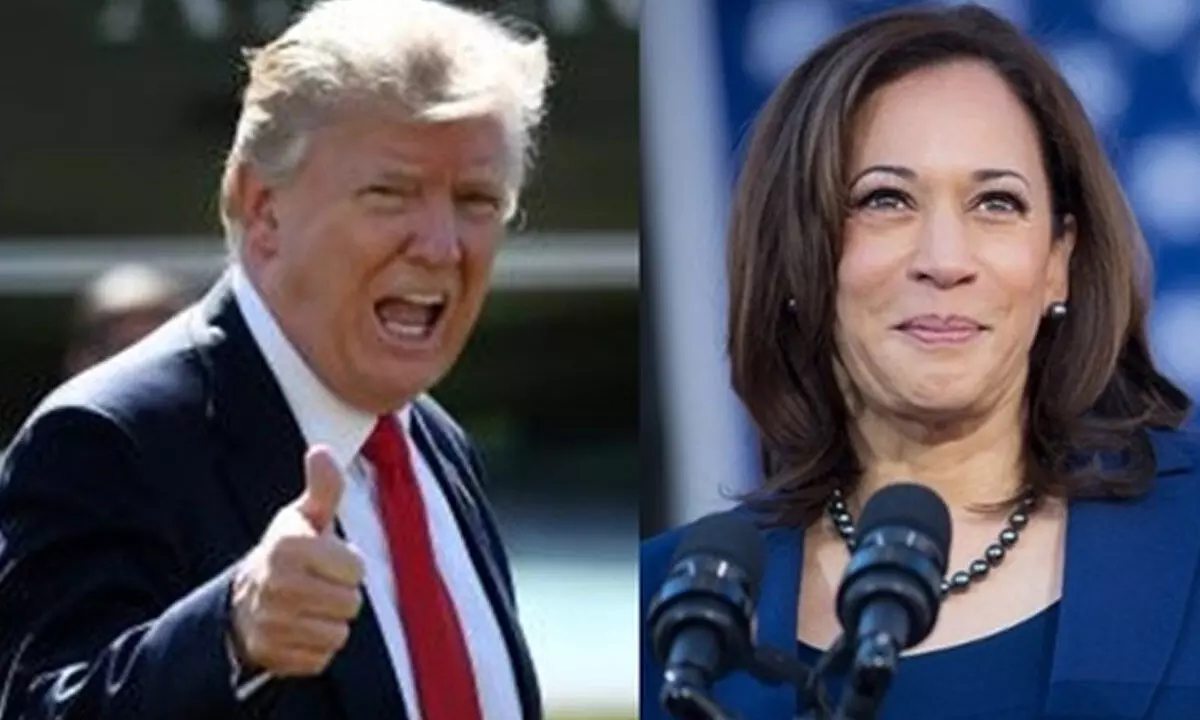Kamala Harris trumps Donald among Indian-Americans, shows internal poll
Share :

Kamala Harris, the presumptive Democratic nominee for the post of US President, has a 19 percentage point lead over her Republican rival Donald Trump in favourability ratings among Indian Americans, according to internal polling by the Harris campaign.
Washington: Kamala Harris, the presumptive Democratic nominee for the post of US President, has a 19 percentage point lead over her Republican rival Donald Trump in favourability ratings among Indian Americans, according to internal polling by the Harris campaign.
The findings were released on Wednesday in a memo from Harris campaign chair Jen Q’Malley Dillon on the overall state of the presidential race at this juncture.
It included polls on a whole range of issues. The outcome on Indian Americans was part of the polling among Asian Americans, which also include those of Japanese, Chinese, Vietnamese, Korean, and Filipino descent.
The poll was released internally on July 10, 11 days before President Joe Biden ended his campaign under pressure from Democrats and endorsed Harris to take the top spot on the ticket. She is not the de facto nominee of the party.
The poll measured the favourability ratings of Biden, Trump, Harris, and Nikki Haley, the former US Ambassador to the UN who is also of Indian descent like Harris, among Asian Americans.
A combined total of 54 per cent Indian Americans said they have a “very favourable” to “somewhat favourable” impression of Vice President Harris, which was 19 percentage points more than Trump’s 35 per cent.
She also beat Haley by 21 percentage points but came a shade behind her boss, Biden, who at 55 per cent surpassed her by a solitary percentage point.
The head-to-head match between Biden and Trump showed a remarkable decline in support for the former among the community.
Only 46 per cent of them said they would vote for President Biden if elections were held at the time of the survey, while 29 per cent said they would vote for Trump. As many as 20 per cent either refused to answer, or were not decided yet.
That is a precipitous fall from 2020, when 72 per cent of Indian Americans surveyed by the Carnegie Endowment for International Peace, a think-tank, said they will vote for Biden in a pre-poll survey, while 22 per cent said they will go with Trump.
This fall is likely a reflection of the general lack of enthusiasm for a second term for Biden even though he is liked and seen favourably.
The Harris campaign internal poll showed that 55 per cent of Indian Americans said they planned to vote for Democratic candidates in the US Senate race and 52 per cent for Democratic candidates running for the House of Representatives.
The Republican party has made some headway in the community with 29 per cent of them planning to vote for Republicans running for the Senate, and 31 per cent for Republicans in the race for the House.
The population of Indian Americans in the US is between 4.16 million and 4.4 million, accounting for roughly 1.4 per cent of the US population of more than 333 million.
Only 2.62 million Indian Americans are US citizens of which 1.9 million are registered voters, which is 0.82 per cent registered voters in all of the country. These numbers may seem to make the community look inconsequential numerically, but that is not accurate.
Virginia, a once solidly Republican state, is now reliably Democratic because of its sizable population of Indian Americans and others of foreign descent living and working along the state’s northern region abutting Washington.
The community says it plays a critical role in the swing states that decide presidential elections by hair-thin majorities -- Biden won Wisconsin by 0.63 per cent vote margin last time.
O’Malley Dillon said in the memo that the 2024 race between Harris and Trump will be “tight”.
And in tight races, every vote counts.







